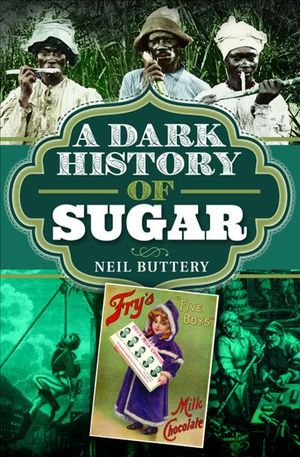A Dark History of Sugar
A revealing history of our passion for sugar—and the medical, moral, environmental, and economic price we pay for it.
A Dark History of Sugar delves into our evolutionary history to explain why sugar is so loved, yet is the root cause of so many bad things. Europe’s colonial past and the British Empire were founded and fueled on sugar, as was the United States, the greatest superpower on the planet—and they all relied upon slave labor to produce it. As this book shows, the exploitation of the workers didn’t end with emancipation. It also reveals the detrimental impact of sugar’s meteoric popularity on the environment and our health, delving into our long relationship with this sweetest and most ancient of commodities.
Renowned food historian Neil Buttery takes a look at some of the lesser-known elements of the history of sugar, delving into the murky and mysterious aspects of its phenomenal rise from the first cultivation of the sugar cane plant in Papua New Guinea in 8000 BCE to its integral part of the cultural fabric of life in the West—at whatever cost. The dark history of sugar is one of exploitation: of slaves and workers, of the environment and of the consumer. Wars have been fought over it and it is responsible for what is potentially the planet’s greatest health crisis. And yet we cannot get enough of it, for sugar and sweetness has cast its spell over us all; it is comfort, and we reminisce fondly about the sweets, cakes, puddings, and fizzy drinks of our childhoods with dewy-eyed nostalgia. The very word “sweet” is used as a synonym for “good” and “innocent.” In this book Neil Buttery argues that sugar is nothing of the sort.
A Dark History of Sugar delves into our evolutionary history to explain why sugar is so loved, yet is the root cause of so many bad things. Europe’s colonial past and the British Empire were founded and fueled on sugar, as was the United States, the greatest superpower on the planet—and they all relied upon slave labor to produce it. As this book shows, the exploitation of the workers didn’t end with emancipation. It also reveals the detrimental impact of sugar’s meteoric popularity on the environment and our health, delving into our long relationship with this sweetest and most ancient of commodities.
Renowned food historian Neil Buttery takes a look at some of the lesser-known elements of the history of sugar, delving into the murky and mysterious aspects of its phenomenal rise from the first cultivation of the sugar cane plant in Papua New Guinea in 8000 BCE to its integral part of the cultural fabric of life in the West—at whatever cost. The dark history of sugar is one of exploitation: of slaves and workers, of the environment and of the consumer. Wars have been fought over it and it is responsible for what is potentially the planet’s greatest health crisis. And yet we cannot get enough of it, for sugar and sweetness has cast its spell over us all; it is comfort, and we reminisce fondly about the sweets, cakes, puddings, and fizzy drinks of our childhoods with dewy-eyed nostalgia. The very word “sweet” is used as a synonym for “good” and “innocent.” In this book Neil Buttery argues that sugar is nothing of the sort.
BUY NOW FROM
COMMUNITY REVIEWS

